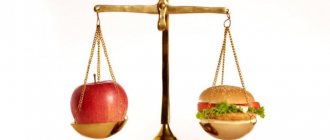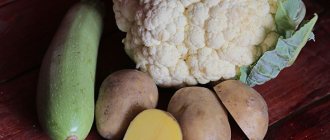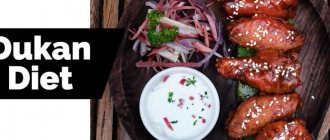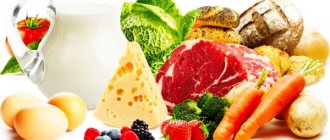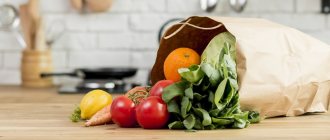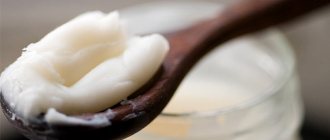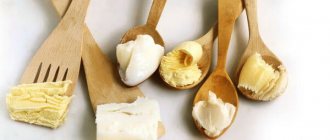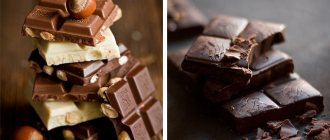- March 19, 2019
- Health
- Oskina Oksana Valentinovna
Fats are essential microelements that must be supplied to the human body every day. After all, they are a source of energy and are needed for the normal functioning of brain cells and to maintain the water balance of the skin. But recently, many people began to give up fats, as they began to talk a lot about their dangers. It is believed that their consumption leads to increased cholesterol levels and weight gain. But in fact, this only applies to animal fats. They really aren't very useful. But it is necessary to consume vegetable fats. After all, they contain essential microelements that are needed for the normal functioning of the body.
What is vegetable fat
The category of such oils usually includes fats of vegetable origin. The extract consists of triglycerides of fatty acids in combination with associated substances (free fatty acids, waxes, sterols, phospholipids, etc.). Oilseeds, which are used to obtain oils, are divided into 4 groups:
- oilseed seeds: flax, soybean, sesame, rapeseed, black cumin, milk thistle, mustard, hemp, poppy, sunflower, cotton;
- fruits of oilseeds: olives, palms;
- waste from processing raw materials containing oils: fruit seeds of grapes, apricots, cherries, as well as seeds of watermelon, pumpkin, sea buckthorn, melon, tomatoes, wheat germ, rice, corn;
- nuts: almonds, coconut, hazelnuts, walnuts, Brazilian, pine, pecan, macadamia.
The process of obtaining vegetable fats is relatively simple, so they can be produced even at home. During the industrial cycle, useful elements are lost in parallel with the removal of excess and harmful impurities. All vegetable fats are divided into 3 groups according to their saturation with acids (plants can belong to different types from the classification above):
- Saturated (solid). They have a dense structure, are extremely poorly digested and settle inside the body. These include palm oil, coconut oil, cocoa oil (this also includes all animal oils).
- Monosaturated liquid (oleic acid, omega-9). Peanut, olive, rapeseed, almond, avocado are useful for diabetes and cancer.
- Polyunsaturated (monounsaturated) liquid (omega-3, omega-6) - are not produced by the body, but their consumption has a beneficial effect on the body. Such oils include sunflower, corn, flaxseed, soybean, etc.
Product table
People consume different types of foods daily, which include animal and vegetable fats. This list includes the products presented in the table. Saturated fat content per 100 g of product:
| Name | Saturated fat, g |
| Meat products | more than 80 |
| Vegetable oils | from 3 to 36 |
| Dairy | from 1.5 to 23 |
| Confectionery | from 4 to 11 |
| Fish and seafood | from 10 to 20 |
| Bread, cereals, cereals | less than 2 |
| Vegetables, fruits (except avocados) | less than 1 |
The human body needs protein foods, so you need to include meat dishes in your diet. The food with the highest saturated fat content at 21.56 g is lard. In next place in terms of this indicator per 100 g of product is duck meat without skin - 8.2 g. Goose meat and bacon contain about 6 g of saturated fat, and lamb without fat and boiled fatty sausage - about 5 g.
It is necessary to include dairy products in your daily diet.
Of these, 23.56 g of saturated fat contains butter, sour cream with a fat content of 20% is 6.38 g, and 10% is about 3.2 g, almost the same amount includes eggs and whole milk. Low-fat cottage cheese and milk contain only 0.15 g of fat per 100 g.
Among confectionery products, milk chocolate has the most saturated fat (10.4 g). In glazed cakes these substances are present in the amount of 6 g per 100 g of product, and in chocolates there are about 8 g of them. They give sweets a special taste and increase their stickiness.
In the vegetable oil group, coconut oil contains a high amount of saturated fat, which amounts to 36.87 g per 100 g of product. Cocoa bean oil contains slightly less of them - 30.43%, as well as palm oil - 24.75 g. Walnut oil contains about 3.63 g of saturated fat.
Top 10 products
Products containing saturated fats are beneficial for the body within the daily norm, which is 7-10% of the total calorie content of food.
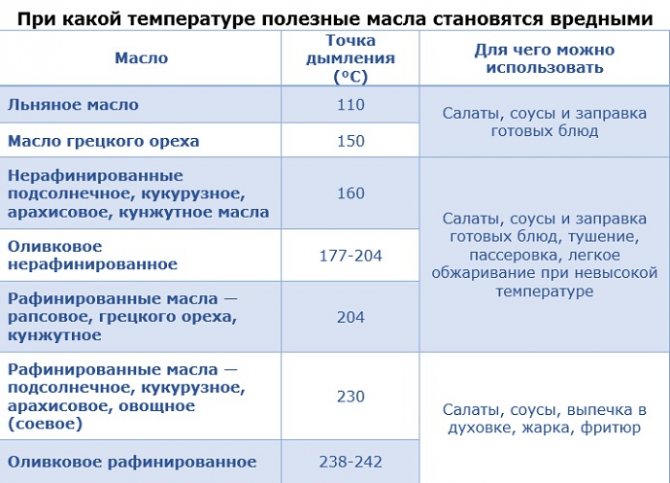
To avoid gaining excess weight, you need to know that the maximum amount of fat contains:
- pork lard - saturates the body with vitamin E, which maintains muscle tone;
- butter - ensures better absorption of protein due to the content of vitamins C and E;
- beef and pork liver are sources of vitamins E, K and H, which form the skeletal system and normalize the process of energy metabolism;
- milk - supplies vitamin C to the tissues, which is involved in the synthesis of hormones and protein, but it can cause allergies due to the lactose content in it, which causes a stressful state associated with the intake of fats that cause inflammation; unpasteurized dairy products are saturated with important the body with zinc and biotin;
- eggs - contain a group of B vitamins, which ensure the normal course of redox reactions; their frequent consumption in raw form leads to impaired absorption of biotin or vitamin B7;
- vegetable oils - products with a liquid consistency, which are characterized by a high content of fatty acids, depending on the degree of their purification, they can be unrefined and refined, the latter contain 2-2.5 times less fat than the former;
- nuts and seeds - can replace cheese, meat or chicken, so it is better not to supplement these products with them, but to eat them separately in salads, adding sesame seeds, peanuts, sunflower seeds, walnuts;
- fish - herring, salmon, sardines, tuna, mackerel, oysters - the best sources of vitamin F, which is essential fatty acids Omega-3, Omega-6 and Omega-9, saturate the body with vitamins B2, B3, B7, B12, iron and zinc ;
- avocado is a fruit with a high content of vitamin F, which is responsible for the condition of the skin, hair, cardiovascular system, and brain activity;
- sausages - products containing large amounts of salt are a source of saturated fat.
To replenish riboflavin (B2) and niacin (B3) in the body, lovers of animal products can eat eggs, salmon, oysters and various seafood, which prevents cracking of the corners of the lips. This problem can be solved by consuming products of plant origin: dried tomatoes, lentils, peanuts, sesame seeds.
Manufacturing
In fact, there are two ways to obtain vegetable fats: pressing and extraction. Industrial volumes and sanitary standards require a long, multi-stage cycle, during which most oils lose their natural value. This is due to the fact that by removing harmful components, it is impossible to separate them from beneficial substances. Because of this, there is constant debate about what type of production and what degree of purification is most beneficial. A simplified production cycle looks like this:
- Processing and purification of raw materials. Grain products are cleaned of debris, husks, and leaves. The hard inner kernels are crushed and fried to a certain degree. For soft fruits (for example, olives), only grinding is used.
- Oil release. When using mechanical extraction, the entire process consists of applying pressure to the raw material mass until the oil is released. For extraction, a special solvent is used, which is mixed with the raw material. After some time it is pumped out. Further operations are specific to each individual crop. The resulting product can already be eaten, but the taste and smell are far from store standards.
- Filtration and settling. For example, for olive oil, this is the last stage of production.
- Refining – removal of mineral and organic substances. The procedure is aimed at improving the taste and technological qualities of the oil. At the same time, refining removes many beneficial vitamins, minerals, phosphatides, and fatty acids. At the same time, oil hydration occurs.
What fats exist and are they all good for the body?
Even if you decide to lose weight, a low-fat menu will not be the right choice. Without lipids, it is impossible to provide a nutritious, healthy diet. They should account for about 30% of the total amount of food consumed if you want to maintain health and an attractive appearance. But it is important to understand that such foods can be very different and have different effects.
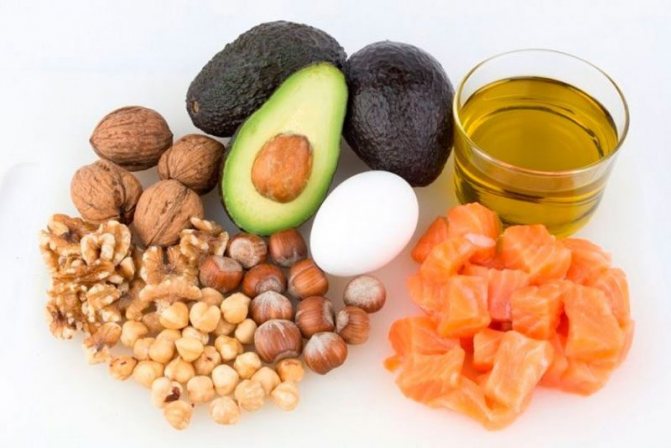
Unsaturated fatty acids
The valuable components of omega-3, -6 and -9 differ significantly from each other and are found in different sources. They are united by the fact that they are necessary for our body, and also have a similar molecular structure - they are not saturated with hydrogen atoms, which is why the name sounds like that. When they talk about foods rich in healthy fats that do not interfere with weight loss, they mean exactly this list:
- mackerel;
- salmon;
- herring;
- tuna;
- halibut;
- squid;
- shrimps;
- flax seeds;
- walnuts.
Nutritionist's comment
Some enterprises produce products artificially enriched with acids of this category - yogurt, soy milk, semi-finished products and even flour. But omega-3 has a specific fishy smell; to get rid of it, it is necessary to carry out complex chemical treatment. This reduces the biological value of the component. Therefore, it is recommended to choose natural sources of fatty acids.
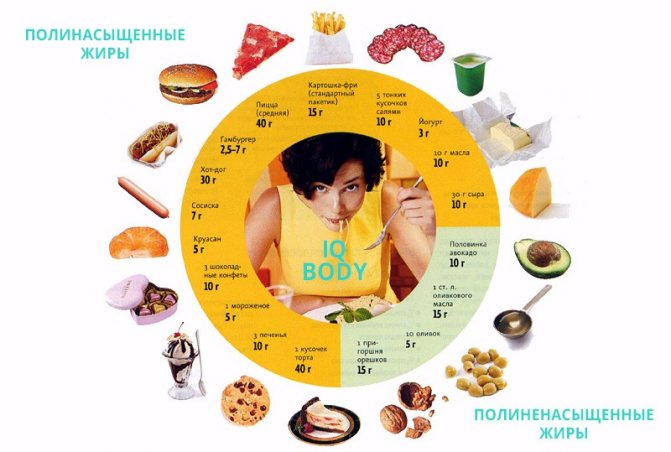
The Omega-6 category also includes essential elements that the body is not able to synthesize. These healthy fats can be found in unrefined vegetable oils:
- corn;
- sesame (also in sesame seeds);
- soy;
- sunflower;
- Pine nuts;
- pistachios.
A small amount is found in eggs, offal and lard (salted, fried will not be beneficial).
But you should be aware of the measure, since an incorrect balance can lead to deterioration in health. The diet should contain more seafood and less Omega-6 acids. An imbalance in the opposite direction can lead to disruption of the cardiovascular system and premature aging.
Nutritionist's comment
High-quality unrefined oils should not be used for frying; heat treatment is harmful for them, since in the process they lose valuable properties and even become toxic. It is better to add them to ready-made dishes and to dress salads.
Omega-9 (oleic acid) receives very little attention compared to the groups described above. This is due to the fact that it can be synthesized by the body, which means it is not essential. But nutritionists still recommend eating foods with these healthy fats; their list mainly includes oils:
- olive;
- peanut;
- almond;
- hemp.
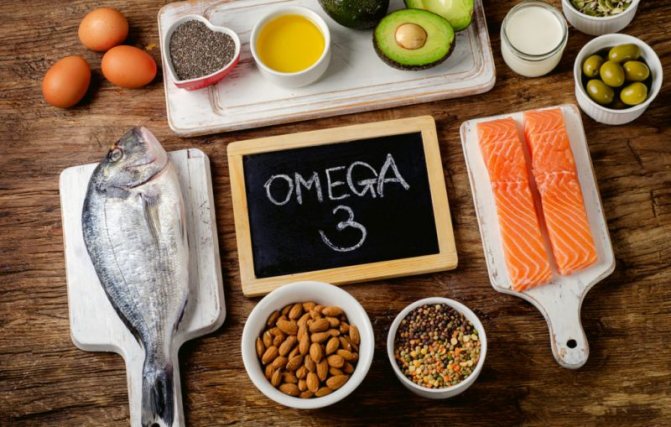
Other sources include beef, pork and poultry.
Saturated
The molecular structure of such lipids contains many hydrogen atoms, due to which the substance has a more viscous and solid consistency. Sources are butter, lard and animal meat, cream and sour cream; fatty acids are also contained in products of plant origin - coconuts, shea tree seeds.
This component is also needed, it is only important to know when to stop. Excess can lead not only to an increase in body volume and weight, but also to health problems, in particular, an increase in the level of “bad” cholesterol in the blood.
If you decide to find out what fats you can eat, and which are the most beneficial for the body when losing weight, then you can draw the wrong conclusion about the dangers of animal fat-containing foods. In no case should you completely abandon it, however, it is important to limit the intake of saturated acids - their share should not exceed 10% of the daily diet.
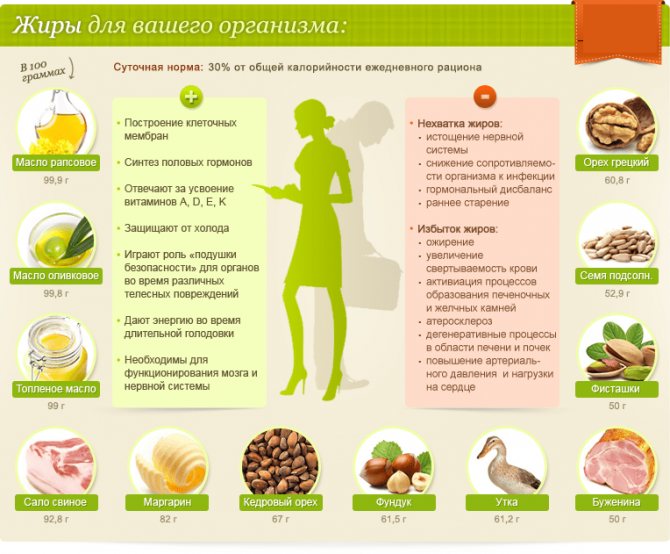
This component is not the main enemy of the figure; this role is played by fast carbohydrates, which trigger the so-called “insulin circle”, which makes us constantly feel hungry. Fatty foods do not have this effect, but excessive doses also have a negative effect on the body. You can’t completely give up natural lipids, but you can avoid sugar and the goodies that contain it, without harm to your health.
Trans fats
The list of foods containing healthy fats does not include fast food, which is produced using margarine and similar fat-containing agents. Such food does not contribute to maintaining a fit, beautiful figure; on the contrary, it only spoils everything - because of it, there is a tendency to obesity, the risk of developing diabetes and cardiovascular diseases.
These are processed lipids, which have many advantages for manufacturers - low cost, long shelf life, stability against oxidation, and the ability to improve the taste and consistency of products. But this list does not include benefits for the body.
After hydrogenation, their structure changes significantly, and with it the functionality of these molecules. They can no longer transport nutrients properly to the tissues and disrupt the normal course of metabolic processes. Where healthy fats are not contained, but only harmful analogues, which are simply deposited on the stomach and thighs:
- industrial desserts;
- French fries;
- refined vegetable oil;
- mayonnaise;
- chocolate;
- chips;
- snacks;
- protein bars;
- semi-finished products and sausages.
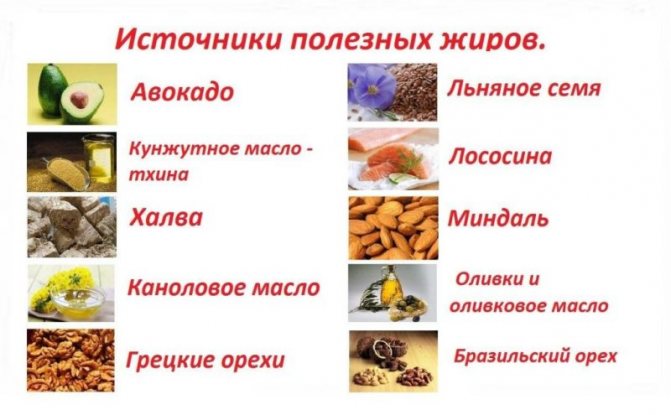
Compound
The composition of vegetable fat directly depends on the source plant. The composition contains mandatory components that form the oil structure of the product. The main thing that needs to be mentioned is: do not believe advertising and branding that claims to remove cholesterol from the product, because it is not found in vegetable oils.
The saturation of natural non-animal fats with vitamins and microelements after the production cycle is artificial. The basic composition of any vegetable oil looks like this:
- unsaturated fatty acids: butyric, caproic, caprylic, decenoic, lauric, myristic, palmitic, stearic, linoleic, nervonic, arachidic, etc.;
- wax;
- phospholipids;
- sterols;
- glycerol;
- vitamins, minerals, microelements.
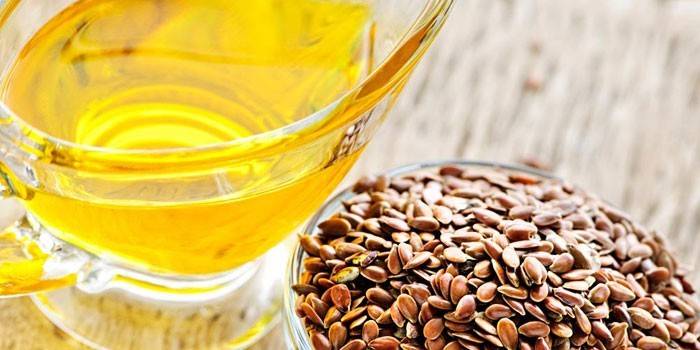
What do they contain?
They are composed of triglycerides of various fatty acids and other nutrients. These acids are important for the normal functioning of the body. Their type and quantity depend on the type of fat. These are linoleic, palmitic, butyric, caproic, stearic, arachidonic and other acids.
In addition to such acids, vegetable fats include:
- sterols;
- phospholipids;
- wax;
- glycerol;
- minerals - zinc, iron, phosphorus;
- vitamins, especially a lot of vitamins E and K.
Thanks to this composition, all these fats are beneficial for the body. But despite the fact that they are recommended to replace animal oils for those who want to lose weight, they are still very high in calories. 100 grams contain almost 900 calories. In addition, they contain only fat as nutrients; they contain neither proteins nor carbohydrates.
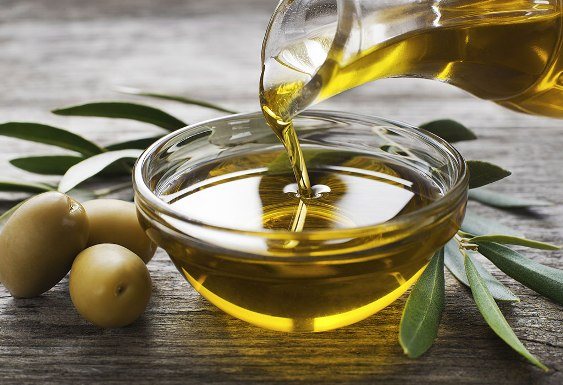
The nutritional value
Although nutritionists widely claim that vegetable fats are healthier than animal fats, you need to remember about the calorie content. The average number of calories per 100 grams is 900 kcal, with fats making up about 98% of the total mass of the substance. This means that valuable beneficial elements, vitamins, etc. – less than 1.5%, the rest are neutral binding components. Nutritional value is an indicator that directly depends on the melting point of the product. The lower this indicator, the better the fat is absorbed.
Refined deodorized vegetable oil is mineralized and fortified artificially, because after refining, everything useful is also lost. This does not prevent vegetable fats from being the main supplier of vitamins (for example, group E), microelements, polyunsaturated fatty acids, which are absolutely important for the body).
| № | Type of vegetable oil | Vitamin E, mg/100 g. | Vitamin K, mg/100 g. | Zinc, mg/100 g. | Phosphorus, mg/100 g. | Iron, mg/100 g. |
| 1 | Rapeseed | 18,9 | — | — | 2 | — |
| 2 | Peanut | 15,7 | — | 0,01 | 2 | — |
| 3 | Coconut | 0,09 | 0.5 mcg | — | — | 0,04 |
| 4 | Sunflower | 44 | — | — | 2 | — |
| 5 | Linen | 2,1 | — | — | 2 | — |
| 6 | Olive | 14 | 62 mcg | — | — | 0,4 |
| 7 | Soy | 17 | — | — | 2 | — |
| 8 | Corn | 18,6 | — | — | 2 | — |
| 9 | Palm | 33 | — | — | 2 | — |
Kinds
Vegetable fats are usually divided into those containing saturated and unsaturated acids. The first include stearic and palmic. A large concentration of such fats leads to the production of bad cholesterol and the formation of plaques on the walls of blood vessels. Once accumulated, this leads to the development of atherosclerosis. Most saturated acids are found in solid oils (palm, coconut, etc.).
Vegetable oils with a high content of unsaturated fatty acids (linolan, arachidonic, docosahexaenoic) are considered to be most beneficial for health when consumed correctly. Their lack causes negative effects from dry skin to slow growth in children, impaired vision, etc. These acids are found in large quantities in nuts, liquid vegetable oils, and pumpkin seeds.
Avoid "bad fats"
Have you noticed how pizza with tomato sauce, cheese and meat hardens after cooling? The hardness of the ingredients is a hint of the high saturated fat content, which hardens even at room temperature. Milk fat and tropical oils (coconut, palm), which are included in almost any ice cream, also largely contain saturated fat. The most popular foods among young people that contain a predominance of saturated fats are pizza and desserts, while boiled meat is a source of protein.
Like carbohydrates, proteins are important macronutrients. Clean white teeth are an indicator that a person eats foods rich in fats and proteins. Protein ensures the synthesis of collagen, which is so important for the structure of bones, teeth and skin.

Harm and benefit
In a simplified sense, fat is the main source of energy for the body (80% of human energy reserves). Vegetable oil contains various acids, phytosterols, and phospholipids, which are absolutely important for normal metabolism. Nutritionists strongly recommend completely abandoning solid and animal fats, because vegetable oil has more beneficial properties:
- polyunsaturated acids omega-6 and omega-3 are not produced by the human body, but are vital for health (prevent blood clots and increased blood pressure);
- vegetable oil stimulates tissue regeneration;
- natural first cold-pressed oils - suppliers of large amounts of vitamin E, which has a positive effect on the condition of the skin;
- vegetable fats are minimally involved in the formation of bad cholesterol, which provokes atherosclerosis;
- metabolic processes are accelerated;
- blood composition normalizes;
- proper nutrition, balancing the vegetable and meat components in the diet, promotes weight loss;
- the immune system is strengthened;
- a strong cell membrane is formed;
- heart function is normalized;
- the strength and elasticity of blood vessels increases;
- retinol and similar substances protect the body from radiation exposure, reduce the risk of cancer, diabetes, and activate protein synthesis.
It is impossible to unambiguously determine the harmfulness of fats, since the negative effect directly depends on the amount consumed and the method of processing the oil. Such a product can also be harmful if you use it exclusively, completely abandoning animal lard. A cheap product of plant origin, with fanatical adherence to diets, provokes serious consequences:
- an excess of vegetable fats without a balance with animals can cause infertility in women;
- after severe heat treatment, oxidized polyunsaturated fats provoke thinning of the artery walls;
- oxidized fats are not absorbed by the body, but settle on the walls of blood vessels, which in the future provokes heart pathologies, cancer, obesity, and diseases of the gastrointestinal tract.
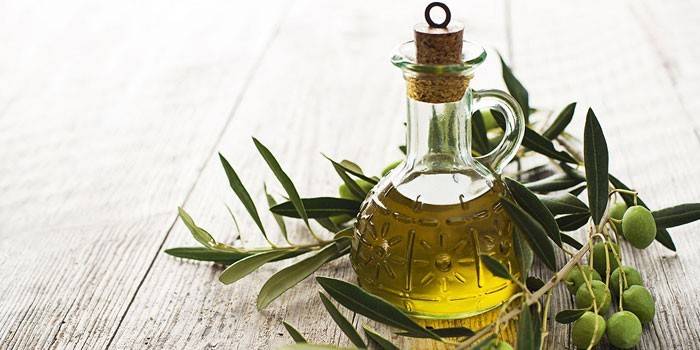
- Why does cellulite appear?
- Fillers, what are they?
- Appendicitis: where is the appendix located in humans?
Beneficial features
Saturated fats in healthy foods are the main source of energy; they help activate the synthesis of hormones in the body and improve its reproductive function.
Saturated fats improve the absorption of vitamin A and also participate in the synthesis of vitamin D.
If a person leads an active lifestyle: works physically or is an athlete, he needs saturated fats to constantly maintain energy and strength at the proper level. By exposing your body to increased stress, you need to replenish it with missing vegetable fats, which are broken down along with vitamins during physical activity.
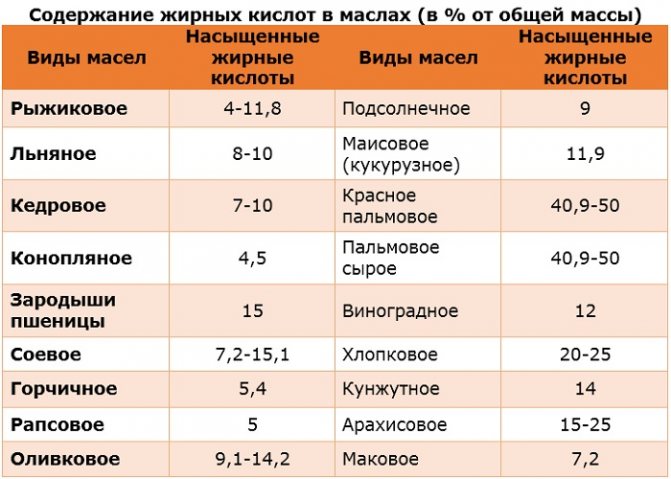
Animal fats are useful for those categories of people whose profession is associated with increased mental stress, for example, teachers, doctors, drivers.
Regular inclusion of butter or ghee in the list of foods consumed helps protect the nervous system from exhaustion, making it healthier. With a balanced diet, the diet must include saturated fats, excluding trans fats.
Adding vegetable and animal fats to your daily menu helps support your immune system. Saturated fats must be supplied to the body in sufficient quantities, which reduces its susceptibility to infectious diseases. As a result, the function of leukocytes in the blood, associated with the identification and destruction of dangerous bacteria, viruses and fungi, is normalized.
Products of animal and plant origin reduce cholesterol in the blood. They are useful for improving skin, hair and nails, and ensure the production of hormones in the body, including testosterone, which is important for active people.
Saturated fats should be regularly present in baby's diet, which will allow the growing body to well absorb calcium, which strengthens bones. Saturated fats, consumed according to the daily norm, prevent heart attacks and strokes, and ensure the prevention of arthritis and arthrosis.
These substances can slow down the process of carbohydrate absorption, which prevents sudden surges in blood sugar and prevents the development of diabetes. Products containing them should be included in the diet of older people, since over time their bones become more fragile.
Sunflower oil during pregnancy
It is important for expectant mothers to properly balance their diet for the full development of the baby. After eliminating many foods, pregnant women often develop problems with the gastrointestinal tract, teeth, hair, and nails deteriorate. Constipation is associated with changes in lifestyle and the rhythm of the body's functioning: low mobility, additional weight, change in diet. In order to normalize the functioning of the gastrointestinal tract, it is recommended to take 2-3 tablespoons of sunflower oil per day (you can simply add it to salads, rather than drink it in its pure form).
Saturation with vitamins A, B and E and additional minerals will improve the condition of nails, hair and teeth. It is important to remember that such a product should be used only in its original form without any heat treatment. In this case, it will help solve cosmetic problems, get rid of constipation and heartburn. The only obstacle to the use of sunflower oil is individual intolerance.
List of products with vegetable fats
The current situation in the food industry is such that vegetable fats are present in all products. The greatest controversy is surrounding palm oil, but scientists do not yet know how harmful or beneficial it is. In stores, it is advisable to carefully read the composition of the product so that you can imagine what is inside. Which food products most often contain refined deodorized palm oil:
- spread, margarine;
- freeze-dried foods (instant noodles);
- ice cream, desserts;
- processed cheese, dairy products;
- industrial baking, bakery products;
- ready-made porridges;
- pastry creams;
- products that imitate meat (soy substitutes);
- sweets, chocolate;
- salad dressings;
- fast food of any kind (contains hydrogenated fats).
Is it possible to eat foods high in fat?
Vegetable fat is not a substitute for animal analogues. Nutritionists, in pursuit of revenue, have seriously intimidated those who monitor their weight and health that a lot of fat is bad. In fact, it is important to eat a healthy and balanced diet. Even foods saturated with fats are not harmful if they are compensated by a healthy lifestyle and natural products. The problem with losing weight is the carbohydrates, not the fats. Restrictions on the use of natural oils occur only in case of personal intolerance in a particular person.
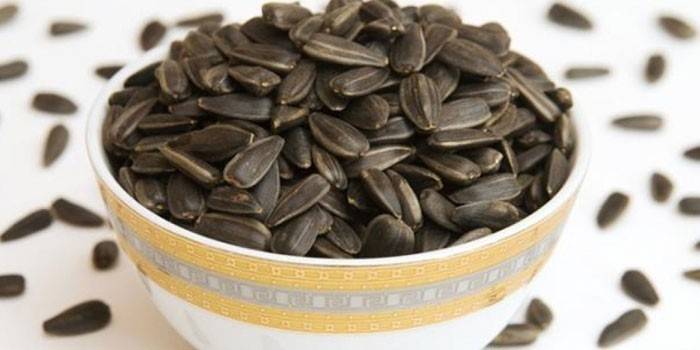
Low-calorie food - good or bad?
Why should you avoid foods that are very low in body fat? Many people do not tolerate this type of diet for long because they consider low-fat meals to be tasteless and full of restrictions. The fact is that fat significantly slows down digestion; many diets based on eating low-fat foods force a person to fight hunger all day long.
Dietary fat plays a crucial role in metabolism - each gram contains 9 kilocalories. This calorie content is life-saving in cases where there is not enough food; it is very important for people who are not able to absorb large amounts of food.
Contraindications
It is not recommended to eat unrefined oil after improper storage or heat treatment: during the frying process, the constituent substances are modified into trans fats (it is better to prepare salads based on it). Vegetable fats in large quantities are contraindicated for those suffering from cholelithiasis. If you have regular diarrhea, the oil should be limited due to its stable laxative effect. If a person decides to replace animal oils with vegetable oils, one should consult a gastroenterologist and nutritionist.
Is there a connection between fats and weight gain?
The fear of consuming fats due to the possibility of gaining excess weight is associated with their high calorie content - a gram of lipids provides twice as many calories as a gram of proteins or carbohydrates. Indeed, when losing weight, it makes sense to keep the level of fat consumed under control.
However, we should not forget that different nutrients have different effects on biochemical processes in the body. Consumption of the contents of fat reserves begins when glycogen reserves in the liver are depleted and the intake of sugars from food is low, so the creation of a carbohydrate deficiency plays a key role in the process of losing weight.
Fat intake should be 10-20 grams lower than for a thin person. Preference should be given to olive and sesame oils, as well as red fish as sources.
